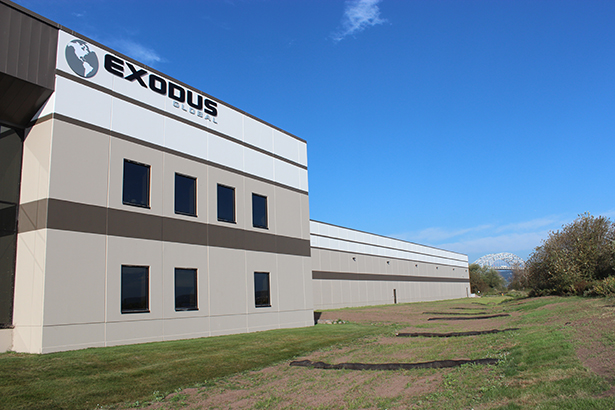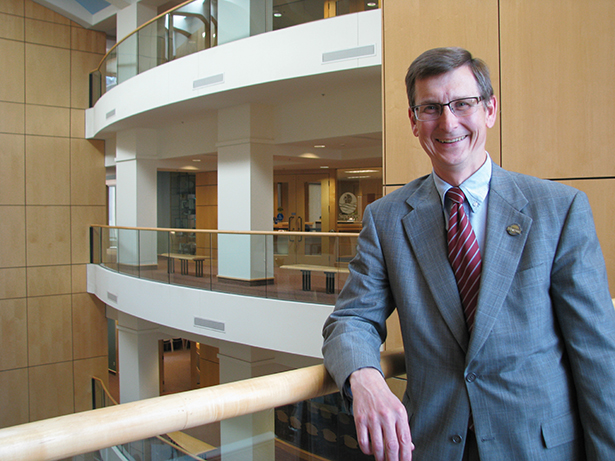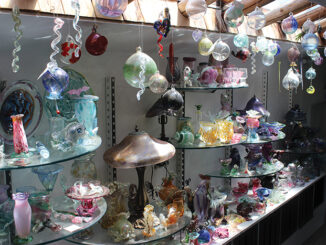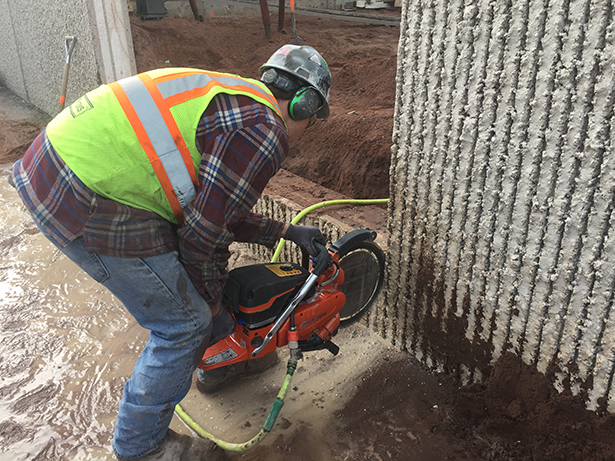
By Patrick Lapinski
Growth is something Exodus Global has seen a lot of recently. Work has been ongoing throughout 2024 toward the completion of an estimated $5 million expansion, adding 27,000 square feet to their manufacturing facility on Connors Point.
Exodus Global is a privately-owned business operated by an industry-knowledgeable leadership team. Leading the team at Exodus Global is CEO Kevin Boreen, who began his association with Exodus as a board member before being asked to take on the role of chief executive officer in 2011.
“I have a fantastic leadership team in place right now, and the support from our owner Murray Johnson is unwavering. We’re on the same page in that we want to continue to be a great employer in the area. That is one of the really important visions we have, to be a premier employer. In order to do that we have to continue to grow.”
The energy and enthusiasm emanating from Boreen comes from a man who knows and understands the business and is laser focused on growing Exodus Global’s market, working with his operations and sales teams to reach new goals. Boreen also appreciates the efforts of the skilled workers who make up the production side of the business, from design to manufacturing, before sending product around the world.
Growth, says Boreen, is something Exodus Global is committed to as a company. “The expansion was necessary from a space standpoint. Over the last three-four years we’ve been on quite a blistering growth pace and just knew that we needed to and wanted to continue to invest, to allow us to continue that growth,” says CEO Boreen.
“We’re not resting on our laurels. We’re going to keep on investing, we’re going to keep on growing. This expansion is an investment in state-of-the-art machine tools, whether they be new machining centers or new robotic weld stations,” says Boreen. “We’ve invested many, many millions of dollars in top technology and have the quality people here to maximize its benefit. It’s been quite a ride and we want to continue that.”
Growth Through Partnerships and Acquisition
Part of the expansion is driven by the evolving corporate relationship between Exodus Global and OilQuick Sweden, whose lead product is a coupling system for hydraulic attachments, says CEO Boreen.
“In 2016 we were their sole distribution into the United States. We always knew when it grew to a certain point we’d have to manufacture that product in house. 2021 was when we started talking about how we were going to make that happen in 2022. Ultimately, the owners of OilQuick Sweden, as well as us here at Exodus, formed a separate company, a joint venture, OilQuick Americas, LLC.”
“It isn’t all just how fast can you build, it is how well you can build it, because customers who have a good experience are customers for life.”
– Curt Klever, Quality Assurance Manager – Exodus Global
Exodus Global also has facilities in Cleburne, Texas, and Bellefonte, Pennsylvania. The Connect Work Tools – Texas location “includes a full rebuild center, parts, service and sales, along with a large stock of all Connect Work Tools products – Hydraulic Breakers, Compactors, Grapples and Pulverizers.”
Rockzone Americas was formed in 2023 following the acquisition of Rockwheel Americas, “the North American Distributor for the RockWheel, RockCrusher and RockScreener hydraulic attachments which are used extensively in the excavation, demolition, pipeline, utility and mining industries.”
The acquisitions compliment Exodus Global’s ShearCore and BladeCore products. ShearCore supports the Fortress line of shears used in the scrap recycling and demolition industries. BladeCore is known for its high-quality replacement blades for mobile and stationary shears and are widely compatible across the industry.
Automation For the Future
Jim Campbell is Vice President of Operations for Exodus Global. He’s an advocate for investing heavily in new equipment, laying the foundation for the future of robotics within the company.
“We felt like we really needed to get ahead of the curve, and we had to automate. We invested heavy into nine welding robots and a large horizontal boring mill, and a second CNC burn table,” says Campbell. “We’re reducing costs, reducing run time. When the demand goes beyond what you can find for labor or people out there, we’re able to do more with the robots, so that’s going to be a big change for us.”
The use of the robotic units has cut run times by 50 percent, claims Campbell. Exodus Global has used the transition to re-train employees in robotic welding, increasing their skill level.
“It’s sometimes a little bit of a jump to go from manual welding to learn robotic welding,” Campbell admits, “but that transition has gone well.”
Many Exodus Global welders attended a specialized welding school in Italy where they were taught the specifics of the robotic welders.
Campbell is proud of how employees stepped into their new roles. “For many I will say it was tough. There are some guys who like to manually weld. They like to weld stuff by hand but I think after they got engaged with the training they realized, hey, I can do this as well. So that’s kind of cool to watch people, maybe a little leery at first, everybody’s fearful of change, but understood that the robots were an opportunity and not a threat to their job.”
Built from the Ground Up
If anybody knows the mobile shear industry, it’s Jim Campbell. He earned his knowledge the old-fashioned way as a young man in his early 20s on the factory floor, making shears for LaBounty in Two Harbors. “I worked for the top manufacturer, and then really from the ground up, built the other two manufacturers,” said the founder of Genesis and later, Exodus Machines. “My background is in shear mobile hydraulic attachments. That’s kind of our wheelhouse.”
As noted, the company started as Exodus Machines, producing wheeled material handlers for the scrap and recycling industry. The company transitioned away from that market to focus on the production of shears and other hydraulic attachments.
Rebranded in 2020 as Exodus Global, the company conducts business throughout North and South America, Australia, portions of Europe, and is looking to develop a footprint in Brazil, among possible locations. Their presence is drawing attention as they increase their market share in the recycling and scrap demolition industry. It’s been a rapid ascent for the young company.
“We are definitely gaining market share, and a lot of that is coming from how we take care of the customer,” says Campbell. “We still believe in building that relationship with the customer; the customer is family. A lot of these scrap yards, the people that buy our stuff, they’re generational companies themselves, handing them down to their sons and daughters and we want to keep that relationship going.”
Expansion Creates Opportunity
The addition of a 20,000-square foot warehouse solved a critical need for Exodus. By dedicating space for warehousing tools and parts, it frees up previously shared space on the production floor, says Quality Assurance manager Curt Klever.
“We are definitely gaining market share, and a lot of that is coming from how we take care of the customer. We still believe in building that relationship with the customer; the customer is family.”
– Jim Campbell, Vice President of Operations – Exodus Global
“Continued annual growth year over year began to fill our facility with equipment, work centers, and inventory. Prior to the expansions our operators often dealt with excessive material handling due to tight quarters; move something to get at something type scenarios. Additionally,” says Klever, “we consumed quite a bit of the valuable under-crane floor space with warehouse inventory due to not having enough capacity in the existing warehouse. The addition of the dedicated warehouse space allows us to reclaim the floor space that is under-crane for manufacturing, and also helps separate warehouse and manufacturing workflows. The additional manufacturing space adds capacity to our production team, and helps soften downtime events for equipment maintenance.”
Klever worked closely with Matt Johnson, Vice President of the Superior contracting firm of J. R. Jensen. on the expansion.
“The Jensen crew was excellent to work with in regard to keeping us up and running. There were some unavoidable service shutdowns for building-wide electrical connections, water outages, but Jensen would coordinate with us on when it would be the least impactful to our daily operations. Often that meant these outages were performed after hours, weekends or during already established break times.”
On the manufacturing side of the expansion, Klever says they were basically duplicating a space they already had. The newly poured production floor at Exodus Global is 60’x120’ (7,200 sq/ft), serviced by two, 10-ton bridge cranes. Bridge cranes throughout the building have lift capacities which vary from 3-tons to 20-tons. The thickness of the concrete floors is 8-inches throughout both expansions. This matches the pre-existing building floor thickness.
A new horizontal boring mill is being installed that will be used for production of their Fortress brand shears. “At the moment, there are still some big areas of empty floor space but it will soon be filled with equipment and workers. We’re still moving into the spaces,” says Klever. “We just recently received a keystone piece of equipment we purchased for the manufacturing area, a new plasma cutting table. We’re still in the early stages of moving in, but certainly expect big benefits.”
Sustaining a Lean Manufacturing Environment
Efficiency on the production floor is part of a company-wide philosophy of lean manufacturing. Exodus Global has been working with the UW-Stout Manufacturing Outreach Center (MOC) in Menomonie, who are engaging them to create and learn tools to help sustain a lean manufacturing environment.
“If you’re going to have equipment, you’re going to have space, you’ve got to know how to use it and take care of it and be efficient and get all the waste out of the manufacturing system.” Campbell has put the entire company through “Lean 101,” so at the least, they understand the basics of lean manufacturing. “We’re building that culture.”
Value Stream Mapping is one of the tools they are using “to identify areas we can make improvements to the locations of equipment, work centers and inventory,” explains Klever. “Proper equipment placement plays a big role in reducing wastes like excessive travel and material handling. As an example, you would incur a lot of wasted motion if you put the equipment for ‘Step A’ on the other side of the facility of ‘Step B.’ Sometimes equipment or spatial restrictions don’t allow you to put the equipment exactly where you want to, but best efforts are made to put equipment in logical positions for the work being performed before and after that equipment is used.”
Klever says it all comes down to creating a quality product and a great customer’s experience.
“We make decisions based on the customers’ requirements and expectations of our product. We work as best we can to eliminate waste and make sure that we’re giving the customer the best experience that they can get,” explains Klever. “It isn’t all just how fast can you build, it is how well you can build it, because customers who have a good experience are customers for life.”
Creating a Positive Work Environment
“I’m proud of the company that we have and that we are creating, and the environment we have here,” says Boreen. “Whether it’s from an employee standpoint or an overall company standpoint, we want to be the company that swims upstream of what may be considered a sea of negativity these days. We want to be that company that takes a positive view, a positive bent on issues that we look at. We’re not going to assume the negative. I’m proud of that, and that we are creating that company environment. I believe it is propelling us to be the premier employer in the area.”
As VP of Operations, Campbell uses the company’s core values as his guide in making decisions. “We care as a company about our people and our customers, we are always ‘on it.’ We like people that are on it, on task. We always do the right thing, in a lot of cases, even when it hurts financially, and then the last core value is fun. We want to have fun. We want people to have fun, right? We want people to enjoy coming to work.”
In keeping with that enjoy work theme, the Thursday breakfast is a new tradition at Exodus Global. It’s a weekly event that takes place in the remodeled atrium and coffee bar space at the company’s headquarters and manufacturing plant on Connors Point. Campbell says they borrowed the idea from the Swedish business partners of their OilQuick division.
“We do it for a couple reasons. One, it’s nice to get together for 10 to 15 minutes every Thursday,” explains Campbell, revealing an additional motive. “We ask our employees meeting out in the atrium or the foyer here to try standing at a table with a different person each time.”
Campbell says they intentionally didn’t want people sitting with a group of friends.
Does it work? Campbell thinks it does.
“We’ve been doing it for quite a few months, and it’s so organic now that you see engineers talking to a welder, or a machinist. Sometimes those kind of departments, they silo up, right? There’s a big wall between those departments. This has really helped us just break down that wall.”
Customer Focused
The expansion at Exodus Global does more than meet the demands of its customers. There is certainly a message being sent from the ownership/management team to the employees, says Campell. “The message we’re sending to the employees is, we’re a privately held, family-owned company, and we are here for the long haul. We believe that these tools are going to allow us to build more with less man hours, and build them very accurately with increased quality. I guess that’s the message, that we’re here for the long haul and we want to create opportunity.”
“I have a fantastic leadership team in place right now, and the support from our owner Murray Johnson is unwavering.”
– Kevin Boreen, CEO – Exodus Global
Exodus Global has arrived as a big player in the scrap recycling, construction and demolition industries. VP Campbell is justly proud of the quality products produced in Superior. “We really pride ourselves on the quality and the resale of the product, but just as important is our service department. Sales get you the first sale, but then service gets you the second and third and fourth and fifth sale, because you take care of your customer. We haven’t strayed from that. We want it. We care about the customer. We treat them like family.”
CEO Boreen sees a bright future ahead for Exodus Global through growth in the core business, increasing throughput, and in designing the next generation of hydraulic attachment. “We’re going to continue to design and build what we believe are the industry-leading attachments. Whether that’s something that is revolutionary, or whether that is a current product but we just simply do it better, and we can do it better because of the engineering staff that we have and the experience that we have here,” emphasizes Boreen. “The manufacturing team that we have is experienced, couple all of that with our investment in state-of-the-art equipment and the sky’s the limit.” P.S.
Patrick Lapinski is a freelance writer who grew up in Superior.



